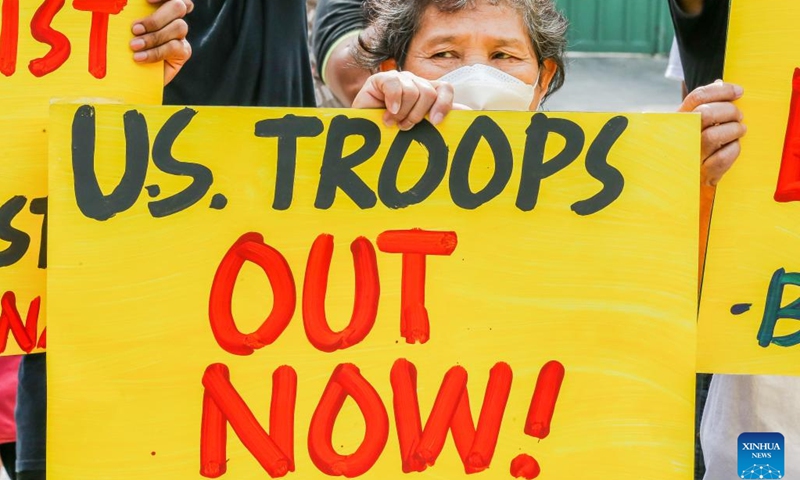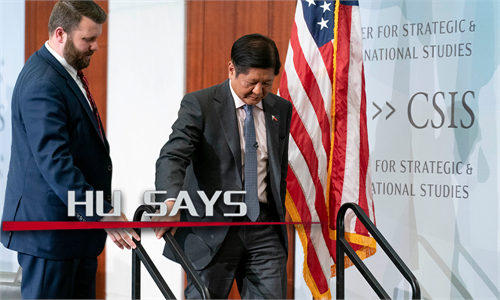By hyping S.China Sea issues, Taiwan question, Washington locks up Philippines into its anti-China fleet: analysts

People hold placards during a protest rally against the U.S.-Philippines Balikatan joint military exercises in front of the gate of the Armed Forces of the Philippines (AFP) headquarters in Quezon City, the Philippines, April 11, 2023. More than 17,000 Philippine and U.S. troops on Tuesday kicked off the most extensive joint military activities in decades in the Philippines amid criticisms that it escalates tension in the region rather than peace and stability.(Photo: Xinhua)
By saying US' "commitment" to the defense of the Philippines was "ironclad," US President Joe Biden is drawing a new small clique with the Southeast Asian country to contain China. This despite Philippine President Ferdinand Marcos Jr repeatedly stating an unwillingness to be involved in the competition between China and the US, the Philippines has been locked up by the US' anti-China fleet, analysts said, warning of heightened tensions in the region due to US' destructive Asia-Pacific policy.
On Monday, Biden met with Marcos Jr in the Oval Office, during which he reaffirmed US' "ironclad" alliance commitments to the Philippines and noted that an armed attack on Philippine armed forces, vessels, or aircraft in the Pacific, including in the South China Sea, would invoke US mutual defense commitments under Article IV of the 1951 US-Philippines Mutual Defense Treaty, according to a joint statement released by the White House.
Marcos Jr referred to "difficult times" and said the Philippines finds itself in a region with "arguably the most complicated geopolitical situation in the world right now." He also noted that it is "natural for the Philippines to look to its sole treaty partner in the world to strengthen, to redefine, the relationship that we have and the roles that we play in the face of those rising tensions that we see now around the South China Sea and Asia Pacific."
Aside from referencing the South China Sea, the joint statement also noted that the two sides "affirm the importance of maintaining peace and stability across the Taiwan Strait."
The US has dominated the keynote of Biden-Marcos Jr meeting and it is forcing the Philippines to sacrifice its own independence to serve for the US' Indo-Pacific strategy. Although the Philippines has reiterated its unwillingness to choose sides between China and the US given its close relations and trade with China, it has been coerced by Washington especially on security issues, Li Haidong, a professor at the Institute of International Relations at the China Foreign Affairs University, told the Global Times.
Marcos told reporters on his plane to the US, that he would not allow the Philippines to become a "staging post" for military actions, US media reported.
Before Marcos kicked off his four-day visit to the US, a growing section of the public in the Philippines have expressed their concern that leaning toward the US may turn the country into the frontline of the competition between the US and China, analysts said.
Writing issues of the South China Sea into the joint statement of the US and the Philippines highlights that Washington has "made" the South China Sea issues as part of the US-Philippines relations as the previous Mutual Defense Treaty did not contain the issues, Chen Xiangmiao, director of the World Naval Research Centre at the National Institute for South China Sea Studies, told the Global Times on Tuesday.
Moreover, it is a dangerous signal that the joint statement also references the Taiwan question, which lays bare the US' attempts to include this question into the bilateral agenda between the US and the Philippines.
"The US attempts to totally tie up the Philippines on its anti-China fleet," said Chen.
In April, the US gained access to four new military bases in the Philippines, bringing the total number to nine, with several bases close to China's island of Taiwan. Some analysts noted that the US sees the Philippines as a potential location to deploy missile and artillery to interfere with the cross-Straits situation.
Chen said that Philippines President did not want to make the country a pawn of the US to contain China, neither did he want to provoke China's core interest. But Marcos Jr's remarks seem "pale and weak" under sustained US pressure.
The joint statement shows that the US is seeking to normalize the discussion of the Taiwan question and to mentioned it at any occasion. The US will never give up hyping the Taiwan question to sow discord between China and the Philippines, Chen said.
Aside from the Taiwan question, the joint statement also mentioned the establishing of trilateral modes of cooperation among the Philippines, Japan and the US, as well as the Philippines, Australia and the US, which analysts said fully exposed US' malicious purposes of inciting confrontation by forming small circles across the Asia-Pacific region.
Li said that the US has already established a trilateral mechanism with Japan and South Korea, and it is now seeking to build a new one with Japan and the Philippines, Australia and the Philippines as well. It is also promoting the Quad mechanism. The US has accelerated the building of small cliques centering the topic of containing China and the situation in the region is becoming more tense due to this destructive US approach.
These small cliques are similar with those the US has built in Europe in 1990s that targeted the Soviet Union. However, China has more experience and resources in dealing with the situation. And as China has closer cooperation mechanism with ASEAN countries and neighboring countries, these countries would prefer to adopt policies based on their own interest, instead of blindly following the US, Li said.
In facing growing US interference, Chen said that China and the Philippines should work to stabilize bilateral relations, continue to promote cooperation in all fields, manage maritime disputes and resist the negative influence of the US.
"Should China-Philippines relations sour, the US will be the beneficiary," Chen said.


